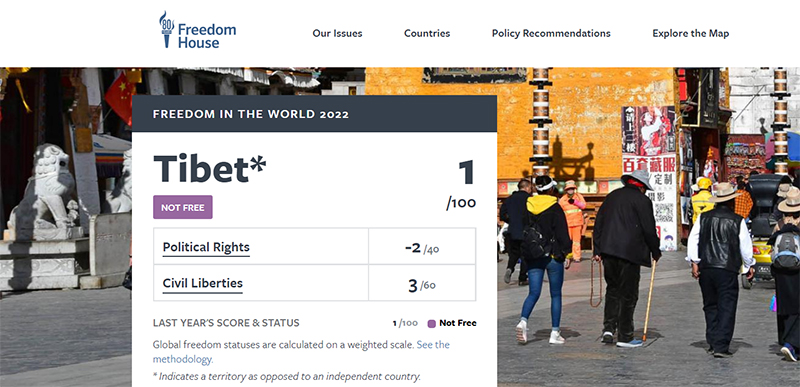Washington, D.C. – According to a new report released by Freedom House, an independent watchdog organisation dedicated to the development of freedom around the world, Tibet is among the least free countries in the world, alongside South Sudan and Syria.
Freedom House, an independent watchdog organisation, based in Washington, D.C. released Freedom in the world 2022, titled “The Global Expansion of Authoritarian Rule” on the first week of March 2022. Tibet had been given the “worst” rating for years, with an aggregate score of one, putting it top among the least-free countries since 2015.
The Freedom in the World report which is released every year assesses levels of civil liberties and political rights across the world. Countries are given a rating out of one hundred with those scoring zero considered as least free. They are then categorised as ‘Free’, ‘Partly Free’, or ‘Not Free’.
Tibet is among the least free countries in the world, alongside South Sudan and Syria in terms of freedom. Tibet scored only one out of 100 in the global freedom ranking, which has been the case for the past seven years, according to the 2022 Freedom in the World report.
The report stated, “CCP authorities control traditional and social media in Tibet even more strictly than in Han Chinese areas of the country. Individuals who use the internet, social media, or other means to share politically sensitive news content or commentary face arrest and heavy criminal penalties. Tibetan cultural expression, which the authorities associate with separatism, is subject to especially harsh restrictions; scores of Tibetan writers, intellectuals, and musicians have been incarcerated in recent years.”
“Deliberate internet blackouts occur periodically in Tibet, including in areas where public demonstrations have occurred. International broadcasts are jammed, and personal communication devices are confiscated and searched. The online censorship and monitoring systems in place across China are applied more stringently in the TAR, while censorship of Tibet-related keywords on the popular messaging application WeChat has become more sophisticated,” it continues.
“Tibetans who communicate with foreign media or other foreign contacts without permission face criminal prosecution and long prison sentences,” the annual report added.
“Religious practice is carefully managed and increasingly restricted in Tibet. The government’s efforts to “Sinicize” Tibetan Buddhism have accelerated in recent years, with officials requiring Tibetan Buddhist clergy and lay believers to pledge their loyalty to the CCP and socialism above their religious beliefs, to denounce the Dalai Lama, and to attend increasingly long political education sessions,” the Freedom House said.
“Freedom of expression, including in private, is severely limited by factors including authorities’ monitoring of electronic communications, a heavy security presence, recruitment of informants, and regular ideological campaigns in Tibetan areas. The authorities in Tibet make use of an invasive security and censorship system that features nearly ubiquitous video cameras, use of facial-recognition technology, “smart” identity cards, and integrated surveillance systems that allow tracking of residents and tourists in real-time. Hundreds of “security centers” operate across the region, with more than 130 in Lhasa alone,” the report states.
“Ordinary Tibetans are regularly detained or sentenced to prison for verbally expressing support for the Dalai Lama and independence for Tibet, sharing images of the Dalai Lama or the Tibetan flag on social media, or sending information abroad about self-immolation protests. Scores of Tibetans have been detained for expressing support for Tibetan language rights on social media,” it explained.
“Tibetans are systematically denied due process in criminal matters. Among other abuses, they are subjected to arbitrary arrest, denial of family visits, long periods of enforced disappearance, solitary confinement, and illegal pretrial detention. Authorities often fail to inform families of the detention, whereabouts, and well-being of loved ones,” the report said.
“The TAR features extreme restrictions on freedom of movement that disproportionately affect ethnic Tibetans. Obstacles including troop deployments, checkpoints, roadblocks, required bureaucratic approvals, and passport restrictions impede freedom of movement both within Tibetan areas—especially the TAR—and between those areas and the outside world. In March 2021, the authorities announced that nearly 2,000 “inspectors” were being deployed to police Tibetan rural communities and staff about 700 “discipline committees” across the region. The increased state scrutiny included tighter travel restrictions and the need for permits to enter certain areas, particularly near international borders in the south,” it reported.
“While Han Chinese tourists have been encouraged to visit the TAR, the movements of foreign tourists, journalists, diplomats, and others are tightly controlled, and they are often denied entry. Foreign tourists must travel in groups with state-approved tour guides and obtain official permission to visit the TAR. Even then, last-minute travel bans are periodically imposed. Tibetans face nearly insurmountable hurdles in obtaining a passport for foreign travel, and foreign nationals of Tibetan origin face enormous challenges when seeking a visa to visit Tibet, in some cases waiting for years only for their request to be denied,” the Freedom House annual report stated.


![Tibet has a rich history as a sovereign nation until the 1950s when it was invaded by China. [Photo: File]](/images/stories/Pics-2024/March/Tibet-Nation-1940s.jpg#joomlaImage://local-images/stories/Pics-2024/March/Tibet-Nation-1940s.jpg?width=1489&height=878)
















